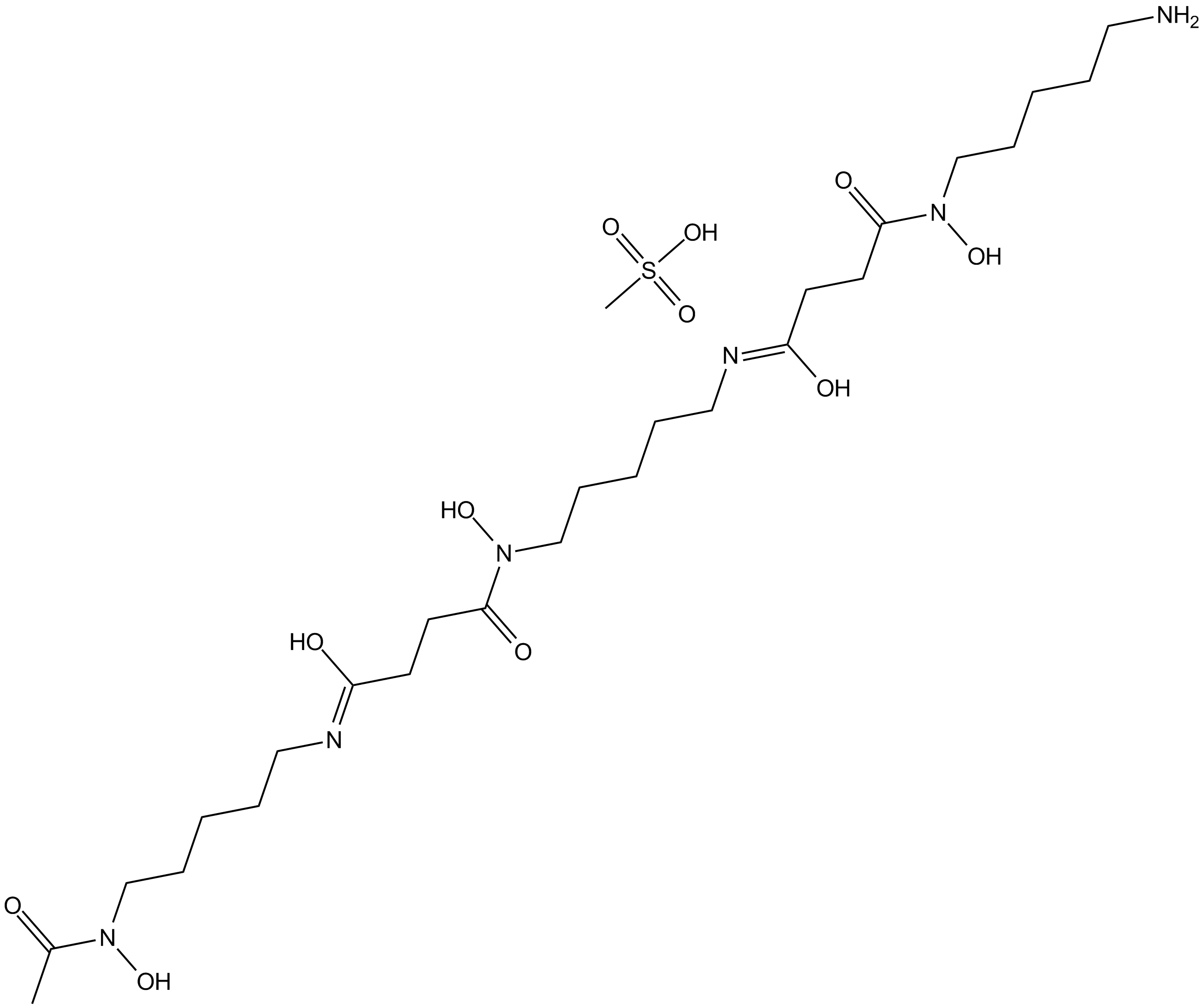Deferoxamine mesylate
|
| Catalog No.GC13554 |
Deferoxamine mesylate is a drug that chelates iron by forming a stable complex that prevents the iron from entering into further chemical reactions, and is used for the treatment of chronic iron overload in patients with transfusion-dependent anemias.
Products are for research use only. Not for human use. We do not sell to patients.

Cas No.: 138-14-7
Sample solution is provided at 25 µL, 10mM.
Deferoxamine mesylate is a drug that chelates iron by forming a stable complex that prevents the iron from entering into further chemical reactions, and is used for the treatment of chronic iron overload in patients with transfusion-dependent anemias[1,2].
Deferoxamine mesylate (260μM) is directly toxic on RPE cells, its toxicity depending on p38[1]. Deferoxamine mesylate administration resulted in reduced cytotoxicity and ROS generation by Fe(Salen) in Rabbit squamous cell carcinoma (VX2) cells, human glioblastoma malignant glioma cells (YKG)OVK18, and human ovarian carcinoma cells[3]. Deferoxamine mesylate (30μM) significantly inhibits the growth of human hepatocellular carcinoma and hepatoblastoma cell lines[4].
Deferoxamine mesylate enhances urinary iron elimination and decreases hepatic iron accumulation after blood transfusion in foals[2]. Deferoxamine mesylate (25mg/kg, intravenous injection) reduced the onset of Fe (Salen) (25mg/kg)-induced acute liver and renal dysfunction. Deferoxamine mesylate (300mg/kg) improves survival rate after systematic injection of a fatal dose of Fe (Salen) (200mg/kg) in Male ICR[3]. Use of deferoxamine mesylate in bone defects promotes vascularization and osteogenesis in the defect area, and maintains the protein activity of HIF-1α temporarily[5]. Deferoxamine mesylate can ameliorate tissue ischemia-reperfusion injury. Deferoxamine mesylate preconditioning protected pancreatic tissue in orthotopic liver autotransplantation in rats[6].
References:
[1] Klettner A, Koinzer S, et al. Deferoxamine mesylate is toxic for retinal pigment epithelium cells in vitro, and its toxicity is mediated by p38. Cutan Ocul Toxicol. 2010;29(2):122-129.
[2] Elfenbein JR, Giguère S, et al. The effects of deferoxamine mesylate on iron elimination after blood transfusion in neonatal foals. J Vet Intern Med. 2010;24(6):1475-1482.
[3] Umemura M, Kim JH, et al. The iron chelating agent, deferoxamine detoxifies Fe(Salen)-induced cytotoxicity. J Pharmacol Sci. 2017;134(4):203-210.
[4] Tabor E, Kim CM. Inhibition of human hepatocellular carcinoma and hepatoblastoma cell lines by deferoxamine. J Med Virol. 1991;34(1):45-50.
[5]DU WY, Yang JW, et al. [Early constant observation of the effect of deferoxamine mesylate on improvement of vascularized bone regeneration in SD rat skull critical size defect model]. Beijing Da Xue Xue Bao Yi Xue Ban. 2021 Dec 18;53(6):1171-1177. Chinese.
[6]Li Y, Zhang PJ, et al. Protective effects of deferoxamine mesylate preconditioning on pancreatic tissue in orthotopic liver autotransplantation in rats. Transplant Proc. 2011;43(5):1450-1455.
Average Rating: 5 (Based on Reviews and 7 reference(s) in Google Scholar.)
GLPBIO products are for RESEARCH USE ONLY. Please make sure your review or question is research based.
Required fields are marked with *





